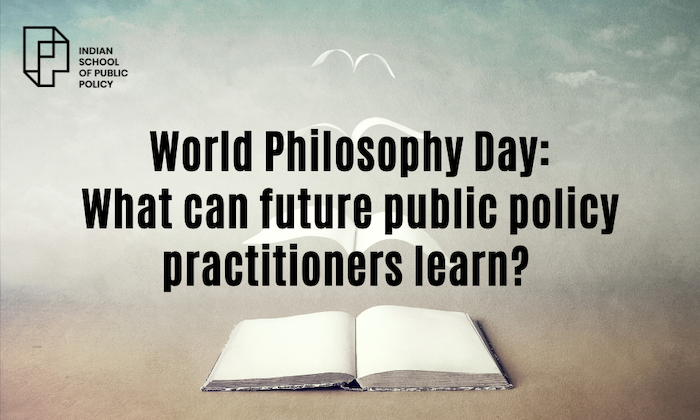
World Philosophy Day: What can future public policy practitioners learn?

Philosophy exists at the root of all human pursuits. In the beginning, everything fell under the broad umbrella of philosophical inquiry. There was no rigid separation between the spiritual and material realms. Rather, the focus was on holistic human development and gaining complete understanding. Over time, as knowledge advanced, more specialized domains emerged from philosophy.
For example, mathematics grew out of the philosophical study of numbers. Chemistry emerged from the philosophy of chemicals. Likewise, fields like botany, accounting, and economics arose by specializing in different aspects of philosophy.
While the focus differs across subjects, the foundations remain philosophical. This underlying connection is visible in concepts like equilibrium, which appears in economics as supply and demand balance, in biology as homeostasis within an organism, in ecology as environmental stability, and politics as power balance.
Philosophy encourages us to think holistically and recognize the connections between different realms of human knowledge. While specialization allows for deep focus and progress, maintaining a philosophical outlook can help unite the sciences, social sciences, and humanities.
Public policy professionals can gain important insights from philosophy, such as the value of acceptance. Indian philosophy demonstrates this well. Even though Indian schools were dominated by the supreme idea of moksa(liberation): the Charvaka or the lokayata school was still recognized, even though it prioritized materialism and emotional fulfillment.
In policymaking, there are often diverse stakeholders representing different viewpoints. Even when perspectives clash, practitioners should accept each viewpoint with dignity.
Disagreement is inevitable with such a variety of stakeholders. However, respect for the humanity and worth of those with opposing views remains important.
Second, Philosophy aims not just to generate abstract theories, but to investigate the fundamental assumptions and logic underlying real-world practices of politics, science, and morality. This directly relates to policymaking.
Policy professionals cannot simply apply fixed formulas. They must critically analyze the foundation of policy proposals, including the embedded values and moral implications. Philosophy builds the logical reasoning abilities needed to rigorously scrutinize the claims, values, and evidence that policies rely on.
Through philosophical argumentation, assumptions are questioned, inconsistencies revealed, and biases uncovered. This skill is indispensable for policymakers weighing complex trade-offs and examining policies from all angles.
Third and most important, Philosophers are always aware of their limitations. Recognizing the boundedness of one’s knowledge and the complexity of problems guards a policymaker against overconfidence and dogmatism. This philosophical humility visible in the teachings of Socrates, Buddha, and Kant allows a young practitioner to be open to new evidence and ideas.
On the occasion of World Philosophy Day, future public policy practitioners must take inspiration from the teachings of philosophers for the continued development of human thought, for the enrichment of cultures, and for the empowerment of individuals. Philosophy has played an irreplaceable role in the progress of humanity. Its spirit of open inquiry reasoned debate, and dedication to truth provides an invaluable compass for policy professionals entrusted with advancing society. We carry forward philosophy’s legacy of clear-eyed criticism, moral courage, and faith in human rationality to craft policies that serve all people and our shared future.

Harshita Miglani
PDM Scholar, Class of 2024,
Harshita is a meditation enthusiast & certified ‘Yoga Volunteer’ under Ministry of AYUSH. She believes that a healthy mind is the real wealth in the fast paced life. Academic pursuit of ethics , philosophy of technology & socio-political philosophy fuelled her interests towards policy making. Through her blogs, she wants to create a meaningful change in the society.


